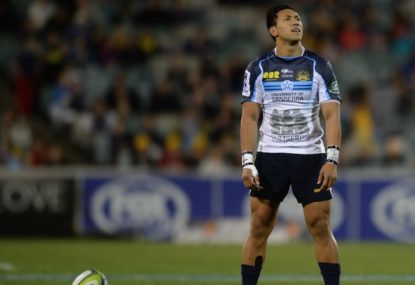Expert

After their 16-9 win over the competition-leading Sharks on Friday night, it’s been really interesting reading the online and social media criticism of the Brumbies.
Interesting in that it’s surprising how short some memories have become, and how the methods employed to win a single game can take over the narrative for an entire season.
Spiro made mention of the Brumbies beating the Sharks at Jake White’s own game, a match he described as “a kickathon contest between two teams playing Jake White tactics of non-running rugby.”
And that’s not an unreasonable description; there were an unusually high number of kicks in the match. The Brumbies kicked the ball out of hand 45 times and the Sharks 42.
That’s more than double the total number of kicks in any match this round bar one: the Reds-Crusaders match that featured 10 tries but also 61 kicks out of hand, of which the Crusaders kicked 34.
Now, I can’t think of anyone suggesting the Sharks looked to play much rugby, yet they only kicked eight more times than the Crusaders, who will be remembered over time as running in tries for fun in Brisbane.
Scratch the surface a little, and the first of their six tries, to Nemani Nadolo, was the only one that can be put down to expansive attacking play inside the opposition half.
Wyatt Crockett’s try from a quick tap took advantage of snoozing Reds defenders, while Johnny McNicholl and Luke Whitelock scored from the Reds making mistakes from Crusaders clearing kicks.
McNicholl took an intercept for his second, the Crusaders’ sixth for the match, which included a kick ahead to turn it into a foot race that he was never going to lose.
Four of the Crusaders’ six tries came from their own half, using one method or another.
So why couldn’t the Brumbies or Sharks run from their own half, instead of kicking?
For one thing, not overly heavy but persistent drizzle all night did make the conditions slippery, and there were 17 handling errors and three players forced into touch for the match. It was a night for tucking the ball under the arm, or, indeed, staying the hell out of your own half.
The other point is that coming into this game the Sharks had let in only 14 tries in 10 matches. Even if the Brumbies wanted to run it out of their own half, they’d have to do that against the best, and most physical defence in the competition, and one of the more abrasive breakdown teams in Super Rugby.
Furthermore, Francois Steyn had kicked 29 from 35 coming into the round. The six he had missed were more often than not from on or beyond the halfway line. Once inside the opposition 40m, he just hasn’t missed this season.
Of course, there was no way of knowing he’d have the kicking shocker he did on the night. And on a greasy night when ball security into contact is going to be a premium, if there’s any team where you wouldn’t run the risk of being pinged in your own half for not releasing, it’s a team with Francois Steyn as the goal-kicker.
The other interesting line of commentary has been that Saturday night was just par for the course from the Brumbies this year, and they haven’t really played anything other than ‘Jakeball’ all season. Which of course is complete bollocks; it is only a fortnight ago that we were marvelling at how the Brumbies managed to put five tries on the Chiefs, in a match that more than a few tipsters expected the reigning champions to win.
The Brumbies are scoring 2.7 tries per game this season, compared to the 2.2 per game last year. Stephen Larkham has been tweaking their attack all season, and has been widely applauded. Suddenly that’s all been forgotten.
The Brumbies rank in the bottom half of the competition for the number of defenders beaten this season, but very much in the top half for the number of clean breaks made. Last season, this was the complete opposite on both counts. The difference this year is that players are finding themselves in space more often, leading to them scoring more tries per game.
The Brumbies kicked the ball just 18 times in that win over the Chiefs two weeks ago, so to suggest they’ve played all season as they did on Saturday night is falling for lazy stereotypes and preconception.
Nevertheless, my favourite criticism of the match is the link to the ongoing broadcast negotiations. ‘How are we supposed to sell the game to free-to-air TV with that kind of display?’ they asked.
Well, it’s simple. You don’t. To use that game as part of your pitch would be stupid.
Yes, rugby is in the entertainment business, but every professional sporting comp in the world has good and bad games. Heck, there are good and bad TV shows, movies, bars, and restaurants too. You have to recognise the bad games for what they are, so that you appreciate the very good ones even more.
There have been so many brilliant games this season to use in the sales pitch. You can be sure the AFL and NRL didn’t secure their billion-dollar paydays using their worst games in the highlight reels, and nor should rugby.
The other angle is that just as people don’t want boring rugby, they want losing rugby even less. The Brumbies-Sharks game was first and second on the table facing off; of course it was going to be a tight and torrid affair, just as Crusaders-Sharks will be this weekend coming.
The best teams in the competition are the ones that can adapt their gameplan to suit their opposition in the first place, and the match conditions on the day.
Of course certain perceptions will always be there, even if they end up more than a tad wide of the mark.